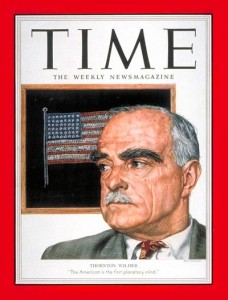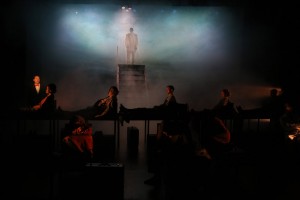In today’s Wall Street Journal I review A Wilder Christmas, an important off-Broadway revival of two rarely seen one-act plays by Thornton Wilder. Here’s an excerpt.
* * *
 For most of us, Thornton Wilder is a man of one play, “Our Town.” But he wrote many other plays, two of which, “The Matchmaker” and “The Skin of Our Teeth,” were equally big hits, as well as a number of shorter works that get done from time to time—usually by students—but are almost never produced professionally. Blessings, then, on the Peccadillo Theater Company for giving us “A Wilder Christmas,” a flawlessly staged double bill of rarely seen one-act plays by Wilder, “The Long Christmas Dinner” and “Pullman Car Hiawatha,” that are as extraordinary in their own ways as “Our Town.”…
For most of us, Thornton Wilder is a man of one play, “Our Town.” But he wrote many other plays, two of which, “The Matchmaker” and “The Skin of Our Teeth,” were equally big hits, as well as a number of shorter works that get done from time to time—usually by students—but are almost never produced professionally. Blessings, then, on the Peccadillo Theater Company for giving us “A Wilder Christmas,” a flawlessly staged double bill of rarely seen one-act plays by Wilder, “The Long Christmas Dinner” and “Pullman Car Hiawatha,” that are as extraordinary in their own ways as “Our Town.”…
In “The Long Christmas Dinner,” first performed in 1931, the scene is the dining room of the Bayards, an upper-middle-class American family circa 1840. The family is sitting down to turkey and stuffing, but there’s no food to be seen and no scenery save for the table and chairs and a pair of “portals” on either side of the stage, one green and leafy and the other bare and bleak. For this is no ordinary dinner: According to the stage directions, “Ninety years are traversed in this play which represents in accelerated motion 90 Christmas dinners in the Bayard household.”…
 In “Pullman Car Hiawatha,” first performed the following year, the scene is a sleeper car on a train going from New York to Chicago. We see five lower berths and three compartments, all represented by simple chairs and benches, and we are introduced by a genial “stage manager” (Michael Sean McGuinness) to 10 passengers who are traveling west at Christmastime. One is a woman (Giselle Wolf) who is being escorted to an insane asylum, another a housewife (Anna Marie Sell) who will die en route. Yet “Pullman Car Hiawatha” is no “Grand Hotel”-style melodrama but a fanciful group portrait of the passengers and their places in the world…
In “Pullman Car Hiawatha,” first performed the following year, the scene is a sleeper car on a train going from New York to Chicago. We see five lower berths and three compartments, all represented by simple chairs and benches, and we are introduced by a genial “stage manager” (Michael Sean McGuinness) to 10 passengers who are traveling west at Christmastime. One is a woman (Giselle Wolf) who is being escorted to an insane asylum, another a housewife (Anna Marie Sell) who will die en route. Yet “Pullman Car Hiawatha” is no “Grand Hotel”-style melodrama but a fanciful group portrait of the passengers and their places in the world…
Though both plays are shot through with darkness and sorrow, there is nothing lugubrious about them. “Sad things aren’t the same as depressing things,” one of the Bayards says. “I must be getting old: I like them.” So will you—though you’ll shed more than a few tears as you watch the characters come to terms with the passage of time and the inevitability of death….
Despite their comparative obscurity, “The Long Christmas Dinner” and “Pullman Car Hiawatha” are profoundly poetic miniature masterpieces, and I doubt you’ll ever see either one done better.
* * *
Read the whole thing here.
To listen to or download “Thornton Wilder, Keeper of the Time Capsule,” an episode of NBC’s Biography in Sound, go here.
In this 1957 radio documentary, narrated by Garson Kanin, Wilder can be heard reading excerpts from The Bridge of San Luis Rey and Our Town. Also featured are Isabel Wilder, Wilder’s sister, and Jed Harris, the director of the original 1938 Broadway production of Our Town.
